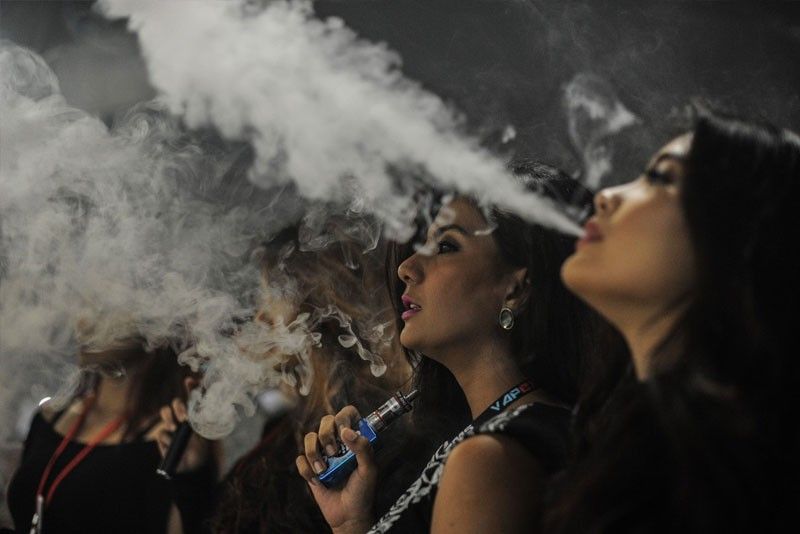Senate panel recommends increase of ‘sin taxes’

MANILA, Philippines — The Senate ways and means committee yesterday recommended approval of the proposed increases in taxes on alcoholic drinks, e-cigarettes and heated tobacco products (HTPs) to raise revenues for funding the Universal Health Care (UHC) law as well as to curb vices and addiction.
Sen. Pia Cayetano, chair of the committee, sponsored the bill imposing higher taxes on alcohol products, e-cigarettes and HTPs, which she said is projected to raise around P40 billion to P50 billion in incremental revenues to help the government fully implement UHC, and move the country closer to achieving its Sustainable Development Goals (SDGs).
“We are driven by the resolute support that President Duterte has expressed for higher taxes on alcohol and e-cigarettes. During the hearings, the medical community and civil society were united in urging Congress to regulate and use the power of taxation as a regulatory measure,” Cayetano said in sponsoring Senate Bill 1074 in plenary.
“Taxation is not a cure-all solution but it is necessary to curb vices and addiction and we must utilize it,” she said.
She, however, stressed that taxation is just one tool and that a comprehensive strategy is necessary to curb vices and addiction as she urged the Department of Health to work with the medical community in achieving such goal.
For e-cigarettes, vapes and other HTPs, the senator said the government must exercise caution even as the Philippine medical community has already expressed grave concern over the dangers of such products.
“In fact the science is all very new and while experts around the world are still studying this, we have already seen and heard an avalanche of news of people who died because of lung failure in the United States – people who were consistent users of these vape products,” Cayetano said.
“For the sake of our children, we must regulate and tax e-cigarettes at parity with regular tobacco products. Other countries are already doing this. We should at least keep pace. Vaping is not cool when it leads our kids to the path of new addictions,” she said.
Under the bill, HTPs will be slapped P45 per pack of 20 units starting Jan. 1, 2020. The excise tax will be increased by increments of P5 every year thereafter until it reaches P60 per pack in 2023.
For individual cartridge, refill, pod or container of vapor products with nicotine salt, an excise tax of P45 per milliliter or a fraction thereof shall be imposed. The tax will increase by increments of P5 until it reaches P60 in 2023.
For conventional “freebase” or “classic” nicotine, a tax of P45 per 10 ml or a fraction thereof will be imposed. The levy is to be increased by P5 every year until 2023.
Distilled spirits will be subject to ad valorem tax of 20 percent and specific tax of P90 per proof liter starting 2020. It will increase by P10 every year until 2023. The specific tax rate will increase by 10 percent every year thereafter.
For fermented liquor (beer) and “alcopops,” the bill seeks to impose a specific tax rate of P45 per liter in 2020, increasing by P10 every year until 2023. The specific tax rate will increase by 10 percent every year thereafter.
For wine products, a specific tax of P600 per liter will be imposed for sparkling wines and P43 per liter for still and carbonated wines. These rates will increase by 10 percent every year thereafter.
Although eyed as main recipients of sin tax revenues being the implementers of UHC, the DOH and the Philippine Health Insurance Corp. (PhilHealth) would actually be shortchanged by P28.3 billion in the Tax Reform for Acceleration and Inclusion (TRAIN) law or Republic Act 11346, according to Sen. Ralph Recto.
He said the two agencies are facing “severe budget anemia” in 2020 due to sin tax dividend shortfall of P28.3 billion, contrary to what’s guaranteed by the TRAIN law.
“Remember, RA 11346 was sold on the seductive promise that taxes collected from sin products will be spent for health. That higher taxes on vice will be used to fund the virtues of health care,” Recto said.
“Government must redeem, and not renege, on this promissory note,” he said, adding Congress will rectify the matter in the ongoing deliberations on the proposed P4.1-trillion national budget for next year.
The TRAIN law mandates that 50 percent of excise tax collections on sin and soda products shall be earmarked for health.
The 50 percent health share shall, in turn, “be allocated and used exclusively” in the following manner: 80 percent for PhilHealth’s UHC and 20 percent for DOH’s Health Facilities Enhancement Program (HFEP) and medical assistance program.
In 2018, total collections from alcohol stood at P68.8 billion; from tobacco, P136.08 billion; from sugar sweetened beverages, P38 billion, or a total of P242.8 billion.
Thus, the combined DOH-PhilHealth 50 percent should be P110.9 billion, net of other deductions. Following the 80-20 sharing, P88.72 billion should go to PhilHealth and P22.18 billion to DOH-HFEP and medical assistance. – With Cecille Suerte Felipe
- Latest
- Trending






























